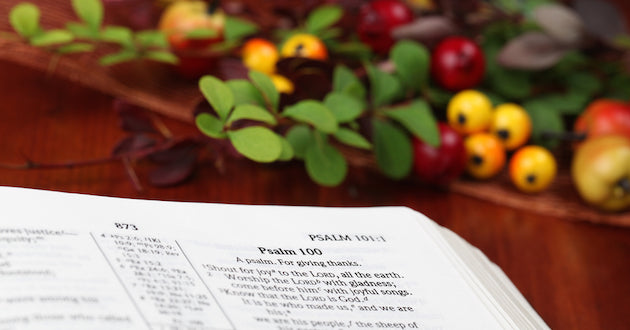Last week, we returned to the Old Testament to take a look at Daniel and his request that he not have to defile himself by eating of the king's meat and drinking of the king's wine, and learned how Daniel's health and mental abilities improved on a veggie diet, devoid of the king’s food and drink.
This week, we return to the New Testament for some more verses Hallelujah Acres has been challenged with. But before we do that, I am going to share a letter received from Deanne, who lives in Jamaica:
own? For ye are bought with a price: therefore glorify God in your body. . .”
And “if any man defile the temple of God, him shall God destroy. . .”
Eating should almost be an act of worship as we thank God for His bountiful provision for the nourishment of the incredible physical body He designed and provided each of us. Do we really feel God is pleased when we place into our mouth something that we know can potentially harm our body, a body that is called by God the temple of the Holy Spirit?!
For instance, animal source foods – flesh, dairy and eggs – are either the cause or a contributing cause of up to 90% of all the physical problems being experienced today. In Leviticus 3:17 the Scripture tells us: “that ye eat, neither fat nor blood.” But that is exactly what a person is eating when that steak is still red with blood and dripping with fat when eaten?
And then there are the growth hormones and antibiotics found in most commercially raise animal products.
If we would but eliminate these animal products from our diet, we could eliminate most of the heart attacks, strokes, cancers, diabetes, osteoporosis, acid stomach problems, and more. Next time you go to eat a hamburger or fried chicken or a juicy steak, see if you can in good conscience ask God to bless it when you KNOW of its potential harmful effects upon your body, "the temple of the Holy Spirit."
And the next time you thirst for that can of soda pop, or desire a piece of candy, donut or pastry, think of the 172 pounds of sugar the average person is putting into their bodies each year — sugar that knocks out your immune system so that it is unable to function as God designed, and thus the body loses its ability to protect you from germs, viruses, bad bacteria... and even cancer.
Not to mention the effects sugar has on one's mental state! Sugar is indeed the cause of much of the irritability, anger, and negative thinking in society today.
Can a person in good conscience ask God to bless these addictive so-called foods that are doing harm to the temple of the Holy Spirit?
White flour products contain no fiber and no nutrition, and quickly convert to sugar, contributing to all of the problems just mentioned above! And because it contains no fiber, it contributes greatly to constipation problems.
God designed food to move through our very lengthy digestive tract through means of fiber!
Yet refined white flour, along with animal products (both flesh and dairy) and refined white sugar, are totally devoid of fiber.
Refined table salt is a protoplasmic poison that does great harm to the body. And I am sure all reading this are aware of the harm the addictive drugs of caffeine, alcohol and nicotine can do to the body!
“Dear George, I am truly thankful for your ministry. I am a resident in Jamaica and have been reading your Hallelujah Health Tips for several months. They have been very informative, particularly your study on "What Did God Tell Us We Should Eat?" Although I knew from my readings, the testimonies of others, and my own experience when I chose to eat mainly raw foods, that a plant-based diet benefits the body, I still questioned how this fact lined up with scriptures. Thank you for the eye-opener regarding Acts 10. I am taking the Daniel 21-day challenge!”Now, on to the New Testament. Though the following verses have nothing whatsoever to do with what we should or should not be eating in today’s world, but rather a problem that existed in the early church, some have tried to use this portion of Scripture to say that only people who are “weak... eateth herbs (VEGETABLES)”:
“Him that is weak in the faith receive ye, but not to doubtful disputations. For one believeth that he may eat all things: another, who is weak, eateth herbs (vegetables). Let not him that eateth despise him that eateth not: and let not him which eateth not judge him that eateth: for God hath received him.” ~ Romans 14:1-3Friends this has nothing to do with physically “weak” people eating veggies, (notice it very clearly says “weak IN THE FAITH!” Rather, it has everything to do with the eating of flesh offered to idols. For a little more light on the subject, let’s look for a moment at a passage Paul wrote a little earlier to the Christians at Corinth in I Corinthians 8:4, 7-10, 13, dealing with the same subject:
“As concerning the eating of those things that are offered in sacrifice unto idols, we know that an idol is nothing in the world, and that there is none other God but one. . . Howbeit there is not in every man that knowledge: for some with conscience of the idol unto this hour eat it as a thing offered unto an idol; and their conscience being weak is defiled. But meat commendeth us not to God: for neither, if we eat, are we the better; neither, if we eat not, are we the worse. But take heed lest by any means this leberty of yours become a stumbling block to them that are weak. . . Wherefore, if meat make my brother to offend, I will eat no flesh while the world standeth, lest i make my brother to offend.”These Scriptures have nothing to do with the eating of clean or unclean foods as outlined in Leviticus 11, nor does it have anything to do with “weak” Christians eating only vegetables, but rather it has everything to do with the eating of foods “offered to idols.” In Paul’s day, people worshiped many different gods, and brought animals to the temples of their gods and presented them as an offering to that idol. They killed the animal and prepared the meat. But the idol couldn’t eat that meat! So what happened to the meat? The priests of that god would eat some of it, and the rest was sold in the market. To some, the buying and eating of this meat was considered an act of worship to the god to whom it had been offered. Christians, who had recently been converted to Christ from a pagan religion, felt the act of eating meat offered to an idol was a repudiation of Christ, and a return to worshipping their former pagan god. Yet there were other Christians, who hadn’t necessarily had the same background, thus they had no problem eating meat that had been offered to an idol. They knew that an idol was merely some object of wood or stone that had no spiritual value, and thus any meat offered to those idols had no spiritual value, for they weren’t worshiping that pagan god or idol. Paul’s whole reason for dealing with this subject in Romans 14 and I Corinthians 8 was to encourage Christians to be sensitive to each other’s backgrounds and convictions. Those Christians, who had no problem eating meat offered to idols, shouldn’t eat it if it would become a stumbling block to a weaker Christian who came from a different background. Another thing important to note here, is that Paul clearly is not saying to those who are strong in the faith that they can now eat anything they want, regardless of whether that food is good for them or not. In fact, Paul had already instructed them in Romans 12:1-2 with these words concerning their physical bodies:
“I beseech you therefore brethren, by the mercies of God, that ye present your bodies a living sacrifice, holy, acceptable unto God, which is your reasonable service. And be not conformed to this world: but be ye transformed by the renewing of your mind, that ye may prove what is that good, and acceptable, and perfect will of God.”And in I Corinthians 6:19-20 Paul had this to say:
“What? Know ye not that your body is the temple of the Holy Ghost which is in you, which ye have of God, and ye are not your own? For ye are bought with a price: therefore glorify God in your body, and in your spirit, which are God’s.”And then there is this most powerful Scripture in I Corinthians 3:17 where Paul writes:
“If any man defile the temple of God, him shall god destroy; for the temple of God is holy, which temple ye are.”And in I Corinthians 10:31:
“Whether therefore ye eat, or drink, or whatsoever ye do, do all to the glory of God.”Friends, how can Christians today in good conscience, eat things that they know are harmful to their bodies? Do they not realize that their body is “the temple of the Holy Ghost and that they are not
Each one of us should ask ourselves the following questions before we ask God to bless something we are about to put into our mouth:
-
Is this good food for my body?
-
Is this food going to strengthen God’s Temple and make me more fit for the Master's service?
-
Does the eating of this food bring glory to my God?”





